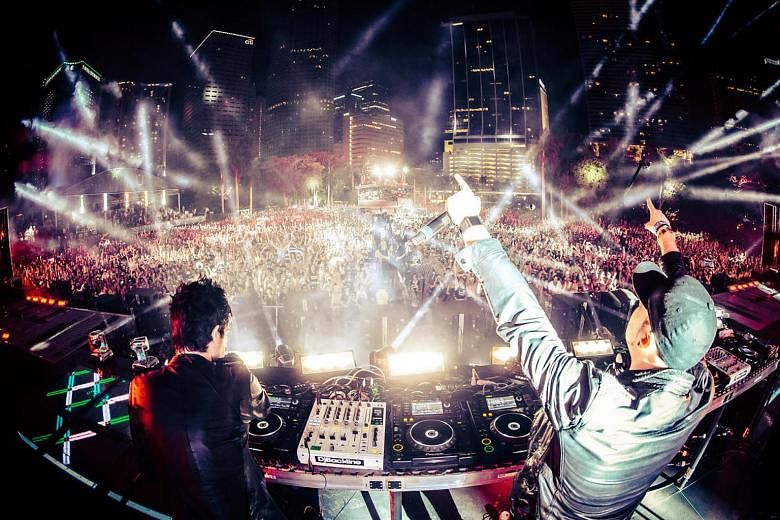Home-grown club Zouk wasted no time embarking on an international expansion drive ever since conglomerate Genting Hong Kong bought it late last year.
In February this year, it announced ZoukOut would be going regional with preview shows in the Philippines (April 31 and May 1) and Hong Kong (Oct 7). Then there was the announcement that it would be hosting a stage for electronic dance music (EDM) at renowned Japanese music festival Summer Sonic later this month.
Three months later, it confirmed Zouk At Sea, a club on the high seas, aboard the Genting Dream, the newest ship by Genting.
All these developments sure created much buzz for the Zouk brand, and from Genting's perspective, it made perfect business sense to do so. Why else would you acquire a respected brand if not to market it?
That said, the strength of Zouk's brand, before the Genting buyout, had been more about being independent and trendsetting than commercial. Its focus was on providing quality music and great nightlife experiences, mostly in one spot, instead of becoming an expansive business empire that happens to be in the nightlife industry.
Would the Zouk of old have thought it necessary to organise a beach music festival like Beach Beats earlier in the year, when it already had the annual ZoukOut at the end of the year? Or would it have anticipated that it would not take off?
The festival has since been moved indoors to Zouk itself, with the same line-up and a cheaper ticket price.
Back at the home base of Jiak Kim Street, before its move to Clarke Quay, there was the Aly & Fila episode in March that was perhaps the first indication of a leadership change.
The incident saw an international DJ unceremoniously leaving the DJ decks so that the son of Malaysian Prime Minister Najib Razak, allegedly a close friend of the new owners, could take to the decks.
Partygoers were left incensed and the online firestorm was massive, with many of Singapore's "trance family" refusing to step into the club again. Fila himself declared he would never play there again.
The incident was uncharacteristic of Zouk, which had on previous occasions, allowed Fila and many other top DJs to play way past their contracted set times.
There were whispers that "this would never have happened under Lincoln", referring to nightlife stalwart and original Zouk owner Lincoln Cheng, who was at the club's helm for more than 20 years before selling it for an undiclosed amount.
Lincoln-era Zouk, when Mr Cheng remained extremely hands-on throughout his tenure, accorded artists the utmost respect and kept them coming back .
In an interview with The Straits Times last year, respected DJ Armin Van Buuren who has played at Zouk and ZoukOut several times, talked about how Mr Cheng "treated both his customers and DJs well".
In the wake of Fila-gate, however, regular partygoers still showed up the next day and even on a Monday, packing the club. It was as if it had all blown over.
Perhaps that demonstrates the strength of the Zouk name, that a slip-up could be forgiven so easily.
But how much more goodwill can be withdrawn from the Zouk legacy?
Is the Fila incident a harbinger of more incidents that could dent Zouk's reputation as a world-class temple of dance music? In April this year, the club was ranked No. 6 in the world by the authoritative DJ Mag alongside world-famous clubs such as party capital Ibiza's Space and Amnesia.
Despite its lofty position on the list, gone are the days of marathon six-hour sets with Danny Tenaglia or Sven Vath. Cutting-edge dance music tastemakers such as Richie Hawtin and John Digweed would have been the highlights of the year for aficionados.
Then there were the genre-bending Bjork and Grace Jones in the 1990s and a reedy Steve Aoki before he became a household name in the late 2000s.
In its heyday, Zouk used to be a trendsetter, rather than one that showcased the flavour of the week or what was #trending.
Now you are more likely to see mainstream EDM's latest "it" boy on the roster. Three weeks ago, it was Snapchat superstar and Dutch DJ Oliver Heldens and last week it was Portuguese up-and-comer Kura as the Friday night headliner.
Now the only thing setting Zouk apart from a Las Vegas-style nightclub is bottle service and "trains" of champagne with sparklers. The purists doth protest.
The kids - or mainstream partygoers who are inevitably younger - love it and the club is packed to the gills, but at what cost?
Is Zouk en route to turning into another chain club like Las Vegas' Hakkasan or Spain's Pacha?
Regardless of the direction Zouk takes, there are no foreseeable alternatives that could step in to take its place at the top of the clubbing food chain in Singapore.
Might the Fila incident have been less quickly forgiven and forgotten if clubgoers had viable alternatives?
The likes of Pangea and Avalon have come and gone. The Butter Factory too closed in 2014 after its lease expired.
Though Butter Factory's owners said the club would return in a different form, nothing has materialised.
Zouk remains the only home- grown nightlife establishment that has a legacy, a longlasting one at that, and a proven track record.
There are hints of Zouk harkening back to its glory days with a Tech House-centric event on Saturday called SoulFeed, for instance. The event, though niche, will hopefully be the first of many such nights at the club, making space for genres other than EDM.
Perhaps, this is just the evolution that any big name club undergoes, but here's hoping the soul of the place won't be lost in the process.


